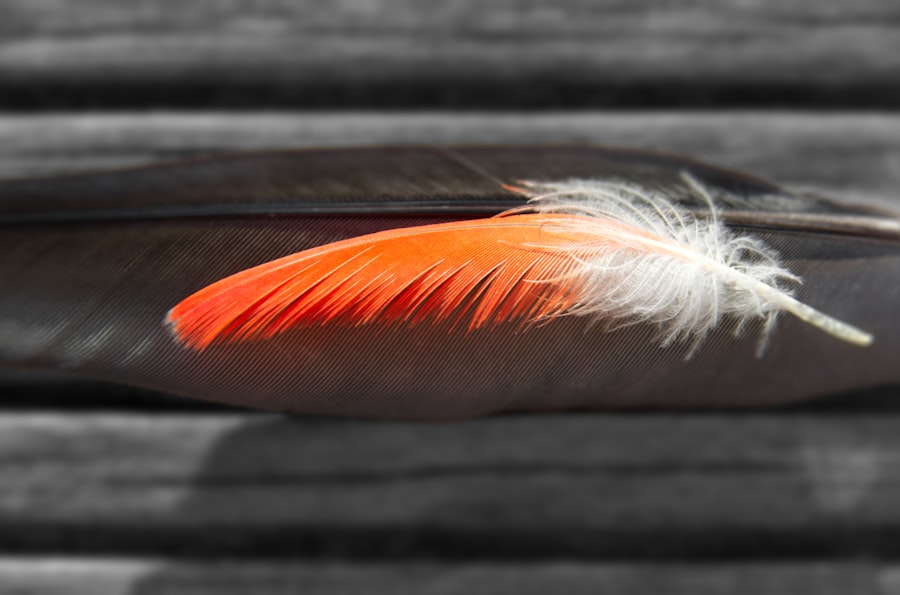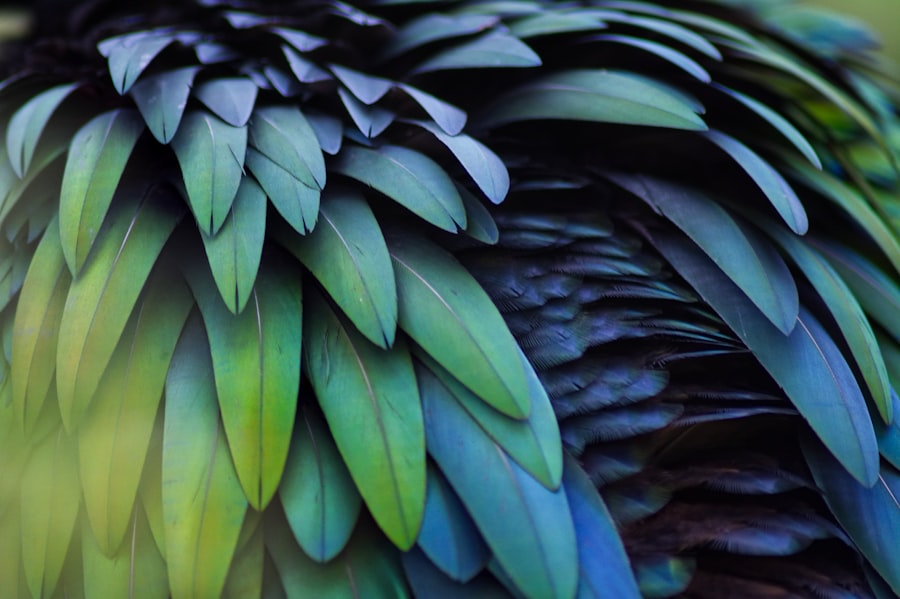Feather pecking is a prevalent behavioral issue in poultry farming that can significantly impact the health and welfare of birds. Identifying the underlying causes of feather pecking is essential for effective management. Several factors contribute to this behavior, including environmental stress, nutritional deficiencies, flock social dynamics, and genetic predisposition.
Environmental stressors play a crucial role in triggering feather pecking. Factors such as overcrowding, insufficient space, poor ventilation, and inadequate lighting can increase stress levels in chickens, leading to heightened aggression and feather pecking. Furthermore, lack of stimulation and boredom can result in chickens engaging in feather pecking as a means to alleviate frustration.
Genetic factors also influence feather pecking behavior. Certain chicken breeds may have a higher propensity for aggressive behavior, which can manifest as feather pecking. When addressing feather pecking issues, it is important to consider the genetic background of the birds, as specific breeds may require tailored management strategies to prevent and control this behavior.
Table of Contents
Key Takeaways
- Feather pecking in chickens can be caused by various factors such as stress, boredom, overcrowding, and nutritional deficiencies.
- Environmental enrichment, such as providing perches, dust baths, and foraging opportunities, can help reduce feather pecking behavior in chickens.
- Deterrents and repellents, such as bitter-tasting sprays or visual barriers, can be used to discourage feather pecking in chickens.
- Addressing nutritional deficiencies by providing a balanced diet and access to grit and oyster shell can help prevent feather pecking in chickens.
- Managing social dynamics within the flock, such as introducing new birds gradually and providing enough space, can help reduce feather pecking behavior.
- Seeking professional advice and intervention from a veterinarian or poultry behavior specialist can provide additional support in addressing feather pecking in chickens.
- Monitoring and evaluating the effectiveness of interventions is important to determine the success of the strategies implemented and make adjustments as needed.
Implementing environmental enrichment for chickens
Outdoor Access and Natural Behaviors
Outdoor access allows chickens to engage in natural behaviors such as foraging, dust bathing, and exploring their environment, which can help reduce boredom and frustration.
Providing Perches and Dust Bathing Areas
Providing perches at different heights within the coop or run can give chickens opportunities to roost and escape from aggressive individuals, reducing the likelihood of feather pecking. Dust bathing areas are essential for chickens to maintain their plumage and skin health, and providing a designated area for this behavior can help prevent excessive preening and feather pecking.
Redirecting Pecking Behavior
In addition, providing objects for pecking and scratching, such as hanging vegetables or commercial pecking blocks, can redirect the birds’ natural pecking behavior away from other flock members. These enrichment activities can help reduce stress and boredom in chickens, ultimately decreasing the likelihood of feather pecking behavior.
Utilizing deterrents and repellents

In some cases, it may be necessary to utilize deterrents and repellents to address feather pecking in chickens. Deterrents are substances or devices that discourage birds from engaging in unwanted behaviors, while repellents are substances that make the feathers or skin of the birds less appealing to peck at. One common deterrent for feather pecking is the use of bitter-tasting sprays or ointments applied to the feathers of affected birds.
These products make the feathers unpalatable and discourage other birds from pecking at them. Additionally, visual deterrents such as reflective tape or hanging objects can startle birds and disrupt their behavior, reducing the likelihood of feather pecking. Repellents can also be effective in preventing feather pecking by making the feathers or skin of the birds less attractive to peck at.
Natural repellents such as garlic or hot pepper sprays can be applied to the feathers or skin of affected birds to deter pecking behavior. It is important to use these products carefully and according to manufacturer instructions to ensure the safety and well-being of the birds.
Addressing nutritional deficiencies
Nutritional deficiencies can contribute to feather pecking behavior in chickens, so it is important to address any deficiencies in the birds’ diet. A balanced diet is essential for maintaining the health and well-being of chickens, and deficiencies in certain nutrients can lead to abnormal behaviors such as feather pecking. One common nutritional deficiency associated with feather pecking is a lack of protein.
Protein is essential for feather growth and maintenance, and a deficiency can lead to poor feather quality and increased susceptibility to pecking. Ensuring that chickens have access to a high-quality, balanced feed that meets their protein requirements is essential for preventing nutritional-related feather pecking. In addition to protein, other nutrients such as vitamins and minerals play a crucial role in maintaining healthy feathers and skin.
Deficiencies in vitamins A, E, and Biotin have been linked to feather abnormalities and increased susceptibility to feather pecking. Providing a well-balanced diet that meets all of the birds’ nutritional requirements is essential for preventing nutritional-related feather pecking behavior.
Social dynamics within the flock can have a significant impact on feather pecking behavior in chickens. Dominance hierarchies, aggression, and competition for resources can all contribute to stress and tension within the flock, leading to increased likelihood of feather pecking. One way to manage social dynamics within the flock is by providing adequate space and resources for all birds.
Overcrowding can lead to increased aggression and competition, so ensuring that chickens have enough space to move around and access to food and water is essential for reducing stress and tension within the flock. Additionally, introducing new birds into an existing flock can disrupt social dynamics and lead to increased aggression and feather pecking. It is important to carefully integrate new birds into the flock gradually, allowing them time to establish their place within the hierarchy without causing undue stress or aggression.
Seeking professional advice and intervention

Expert Insights into Underlying Causes
Consulting with a veterinarian or poultry behavior specialist can provide valuable insights into the underlying causes of feather pecking and help develop a targeted management plan. A veterinarian can conduct a thorough health assessment of the birds to rule out any underlying medical conditions that may be contributing to feather pecking behavior.
Addressing Nutritional Deficiencies
A veterinarian can also provide guidance on dietary adjustments or supplementation to address any nutritional deficiencies that may be contributing to the issue. This expertise can help identify and rectify any dietary imbalances that may be exacerbating feather pecking behavior.
Targeted Management Strategies
A poultry behavior specialist can provide expertise in understanding chicken behavior and developing targeted management strategies to address feather pecking. They can offer insights into social dynamics within the flock, environmental enrichment strategies, and behavioral modification techniques that can help reduce stress and prevent feather pecking behavior.
Monitoring and evaluating the effectiveness of interventions
Once interventions have been implemented to address feather pecking in chickens, it is important to monitor and evaluate their effectiveness over time. Regular observation of the birds’ behavior, plumage condition, and overall well-being can provide valuable insights into whether the interventions are having the desired effect. Monitoring the flock for signs of continued feather pecking or improvements in behavior can help identify any ongoing issues that may need further attention.
Additionally, assessing the overall health and condition of the birds, including their plumage quality and skin integrity, can provide valuable feedback on the effectiveness of nutritional interventions and environmental enrichment strategies. Evaluating the effectiveness of interventions may also involve making adjustments to management practices based on ongoing observations. For example, if certain deterrents or repellents are not proving effective in preventing feather pecking, alternative strategies may need to be considered.
Similarly, if nutritional adjustments are not leading to improvements in plumage quality, further dietary modifications may be necessary. In conclusion, addressing feather pecking in chickens requires a multifaceted approach that takes into account the root causes of the behavior and implements targeted interventions to prevent and manage it effectively. By understanding the underlying factors contributing to feather pecking, implementing environmental enrichment strategies, utilizing deterrents and repellents, addressing nutritional deficiencies, managing social dynamics within the flock, seeking professional advice and intervention when necessary, and monitoring and evaluating the effectiveness of interventions over time, poultry farmers can work towards creating a healthy and harmonious environment for their birds.
If you’ve tried everything to keep chickens from pecking feathers, you may want to consider building a garden chicken coop. This article from Poultry Wizard provides helpful tips and advice on creating a safe and comfortable environment for your chickens while also protecting your garden. Check out the article here for more information.
FAQs
What are some common reasons why chickens peck feathers?
Chickens may peck feathers due to stress, boredom, overcrowding, nutritional deficiencies, or health issues. It can also be a natural behavior for grooming and establishing pecking order within the flock.
What are some methods to prevent chickens from pecking feathers?
Some methods to prevent chickens from pecking feathers include providing adequate space, enrichment activities, balanced nutrition, reducing stress, and addressing any health issues. Additionally, using anti-pecking sprays or applying bitter-tasting substances to the feathers can deter pecking.
Are there any natural remedies to prevent feather pecking in chickens?
Some natural remedies to prevent feather pecking in chickens include adding herbs such as oregano, garlic, or chamomile to their diet, providing access to dust baths, and using essential oils with anti-pecking properties.
When should I seek professional help for feather pecking in chickens?
If feather pecking persists despite trying various preventive measures, or if it leads to injuries or significant feather loss, it is advisable to seek professional help from a veterinarian or an experienced poultry expert. They can help identify the underlying cause and provide appropriate treatment.
Meet Walter, the feathered-friend fanatic of Florida! Nestled in the sunshine state, Walter struts through life with his feathered companions, clucking his way to happiness. With a coop that’s fancier than a five-star hotel, he’s the Don Juan of the chicken world. When he’s not teaching his hens to do the cha-cha, you’ll find him in a heated debate with his prized rooster, Sir Clucks-a-Lot. Walter’s poultry passion is no yolk; he’s the sunny-side-up guy you never knew you needed in your flock of friends!







